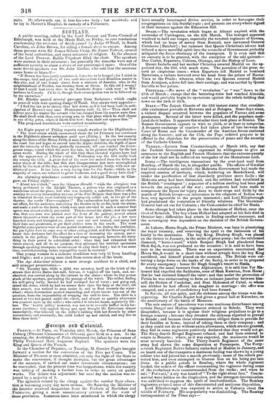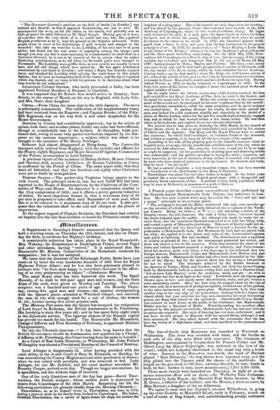gortign an Colonial.
FRANCE.—At Paris, on Thursday 28th March, the Princess of Saxe Coburg (Princess Clementine of Orleans) gave birth to a son. In the evening, the Archbishop of Paris christened the infant by the names of Philip Ferdinand Mary Augustus Raphael. The sponsors were the King and Queen of the French.
In the Chamber of Deputies, on Tuesday, M. Gamier Pages brought forward a motion for the conversion of the Five per C eats. The Minister of Finance at once admitted, not only the right of the State to make the conversion, if thought desirable, but the great advantages of the measure, if carried out under favourable circumstances ; but he contended, that the present time was inopportune, while the country was talking of making a further loan in order to carry on public works. The debate was adjourned ; but next day the motion was re- jected by a majority of 9.
The agitation roused by the clergy against the secular State educa- tion is becoming every day more serious. On Saturday the Minister of
• the Interior received despatches from the Prefects of Morbihan and • Finisterre, giving a most unsatisfactory accouut of the state of those provinces. Instances have been mentioned in which the clergy
survived ; and have actually interrupted divine service, in order to harangue their congregations on this fruitful topic ; and protests are every where signed at their instance against the Education Bill.
SPAIN.—The revolution which began at Alicant expired with the surrender of Carthagena, on the 25h March. The besieged appeared resolved to hold out longer, especially the revolted regiment of Gerona, which had no hope of mercy from Roncali, now surnamed General Carnicero [Butcher] ; but rumours that Queen Christina's advent had infused a more merciful spirit into the councils of Government probably mitigated the fierce obstinacy of the insurgents. It is even said that an amnesty is to be granted, with the exception of the odd quiutett- Don Carlos, Espartero, Cabrera, Olozaga, and the Bishop of Leon. Queen Isabella and her mother Christina entered Madrid on the ap- pointed day, the 23d, with much state. The parasites of the press re- cord an auspicious omen : when Espartero left Madrid to bombard Barcelona, a vulture hovered over his head from the palace of Buena- Vista to the Prado; whereas, when the two Queens entered Madrid from Aranjuez, a dove fell into their carriage, and was carried by Queen Isabella to her palace. PORTUGAL.—No news of the " revolution " or " war." down to- the 27th of March ; except that the battering-train had reached Alnreirla, and would probably begin its operations against the rebels holding that town on the 24th or 25th.
ITALY.—The Leipsic Gazette of the 23d instant states that consider- able excitement prevails at Ravenna and at Bologna. Some days since, a violent dispute occurred between the populace of Faenza andsorne gendarmes. Several of the latter were killed, and the populace muti- lated their bodies. It appears that similar riots took place at Rimini. The Roman Government appears to wish to yield, or at least to temporize. A frequent exchange of couriers had taken place of late between the Court of Rome and the Commander of the Austrian forces stationed along the frontier; and on the 17th, the Pope ordered prayers to be offered in the churches for the preservation of peace and the security of the Catholic Church.
TunxEy.—Letters from Constantinople, of March 18th, say that the Turkish Government has expressed its willingness to give an assurance to the English and French Ministers that the extreme penalty of the law shall not be inflicted on renegades of the Mussulman faith.
INDIA —The intelligence transmitted by the over-land mail from Bombay, of March the 1st, is altogether pacific. The affairs of Gwalior had been satisfactorily settled : the Mahratta Government had made the required cession of territory, which, bordering on Bundelkund, will render the pacification of that disorderly province more facile ; the Mahratta army had been disbanded, and the soldiers had rebnlisted in the British " contingent "; a quarter of a million sterling had been paid towards the expenses of the war ; arrangements had been made to compensate the Ryots for injury done to their crops and fields by the march of British troops—au innovation in the etiquette of Indian war- fare, very agreeable to the people inierested; and Lord Ellenborough had proclaimed the restoration of friendly relations. The Governor- General had set out for Calcutta ; the Commander-in-chief for Simla.
Some change had taken place in the dominions of Holkar, once the rival of Scindrah. The boy whom Holkar had adopted as his heir died in October last ; difficulties had arisen in finding another successor, and the sovereignty was dependent on the decision of the British Govern- ment.
At Lahore, Heera Singh, the Prime Minister, was busy in plundering the royal treasury, and removing the spoil to the fastnesses of his family in the mountains. The boy King, Dhuleep Singh, was placed on the throne in January, in the midst of great pomp ; but the celebrated diamond, " kooh-i-noor," which Runjeet Singh had plundered from Shah Sujah, was not produced on the occasion : it is said to have been sent to the mountains. There was an expectation entertained that Heera Sinsh would in a short time without scruple have the boy King sacrificed, and himself placed on the musnud. The British were col- lecting a large force on the banks of the Sutlej, in order to be prepared for every emergency : hence Sir Hugh Gough's resort to Simla. Among the usual rumours from Afghanistan, it is said that Yar Ma. homed had expelled the Suddozies, sons of Shah Kamram, from brat; that he had declared himself the ruler ; and that under the protection-of Persia he was endeavouring to form an intimate junction between him- self, the Sirdars of Candahar, and Dost Mahomed of Cabul, to whose son Akhbar he had offered his daughter in marriage : the offer was accepted, and a sort of confederacy had been formed.
In Scinde, all was quiet, and the sickness among the troops was dis- appearing. Sir Charles Napier had given a grand ball at Kurachee, on the anniversary of the battle of Meeanee.
The sole source of uneasiness was some mutinous disturbance among certain Bengal and Madras regiments ordered to Scinde. They were dissatisfied, because it is against their religious prejudices to go to a foreign country ; because they dreaded the sickness reported to prevail in Scinde ; and because those circumstances obliged them to provide for their families at home, instead of taking them in their company ; and as they could not do so without extra allowances, which are not granted, they had in some regiments positively declared that they would not go. The Sixty-fourth Bengal Regiment refused, and had been ordered to return to Benares ; where, as it was expected, the mutineers would be most severely handled. The Thirty-fourth Regiment of the same army had shown the same disposition at Ferozepore. The Forty- seventh Regiment Native Infantry embarked at Madras in January, and on board one of the transports a mutinous feeling was shown by a young soldier who had joined but a month previously: some of the others pro- tected him, and even attempted to liberate him on his being put into irons. At a public parade in Bombay, where the whole regiment landed, the orders of the officer commanding the regiment during some of the evolutions were countermanded from the ranks ; and when he said "For ward," a cry was heard of" To the right about face." Courts- martial were holden on the ringleaders, and the strongest determination was exhibited to suppress the spirit of insubordination. The Bombay regiments evinced none of this discontented and mutinous disposition.
Lord Ellenborough was expected to arrive at Calcutta about the middle of February. His unpopularity was diminishing. The Bombay correspondent of the Times says- "The Governor-General's position on the field of battle [in Gwalior] was noticed and blamed: at first it appeared blameworthy, but not so now. He accompanied the army, as did the ladies, on the march, and probably was as little prepared for what followed as Sir Hugh Gough. Having got, as it were, of a sudden into the very thick of it, he could not run, but, like a gallant English gentleman as he is, kept his ground as the brigades advanced. Some people chose to sneer at his distribution of gold mohurs and oranges to the Wounded: but, take my word for it, his Lordship, of his own tact or of good advice, has found out the real secret of popularity among the troops ; and though you may say this is more necessary in a Commander-in-chief than in a Governor-General, he is not to be sneered at for it, except when he makes blustering proclamations, as he did when the Somnith gates were brought to Ferosepore. His Lordship was a griffin then, as new corners are usually termed here, and did odd things, which have passed by. He has again distributed sweetmeats by cart-loads at Gwalior ; and many a Sepoy has heartily enjoyed them, and thanked his Lordship while splicing the main-brace in this simple faehion , but we have no trumpeting forth of the matter, and the object is gained which was desired, and no room is left for persons to be facetious about what nine-tenths do not understand."
Lieutenant-Colonel Outram, who lately proceeded to India, has been appointed Political Resident at Nemaur, in Candeish.
It was supposed that Sir Robert Sale would arrive in Bombay, from Scinde, in the course of March, on his way to England, with Lady Sale, and Mrs. Start, their daughter.
CniNA.—From China the latest date is the 12th January. The news is principally commercial. The ratification of the supplementary treaty had been received from the Emperor ; and Captain Brooke, of the Fifty- filth Regiment, was on his way with it and other despatches for the Home Government.
Business in Canton had considerably improved ; bat in the article of opium, both there and at other places, hardly any sales had been effected, though at considerable loss to the holders. At Shanghae, trade con- tinued dull, owing to some very partial restrictions imposed by the Em- peror on the customs department ; a subject which was about to be brought to the attention of Sir Henry Pottinger.
Sickness had almost disappeared at Hong-kong. The Cornwallis transport safely arrived from England, with the recruits and officers for the Ninety-eighth Regiment, and Major-General D'Aguilar, Commander of the Forces, in succession to Lord Saltoun.
A previous report of the massacre of Bishop Jinbert, Messrs. Chasten and Manban, with seventy Christians, all Roman Catholics, at Cores, is confirmed by the Friend of China. The same paper adds, that they were all beheaded ; and that one hundred and eighty other Christians were put to death by strangulation.
Iffsirrun Sze:rm.—The packet-ship Virginian brings papers to the 11th March. The principal news is, that the new Tariff Bill had been reported in the House of Representatives, by the Chairman of the Com- mittee of Ways and Means. Its character is a compromise similar to the Clay compromise of 1832; and it effects a pretty general reduction of duties. Its most important feature is, that a maximum duty of 30 per cent is proposed to take effect until September of next year, when this is to be reduced to a maximum duty of 25 per cent. It also pro- poses that the .valuations shall be the cost and charges at the places of exportation.
At the urgent request of Captain Stockton, the President had ordered an inquiry into the late fatal accident on board the Princeton steam-ship.



























 Previous page
Previous page